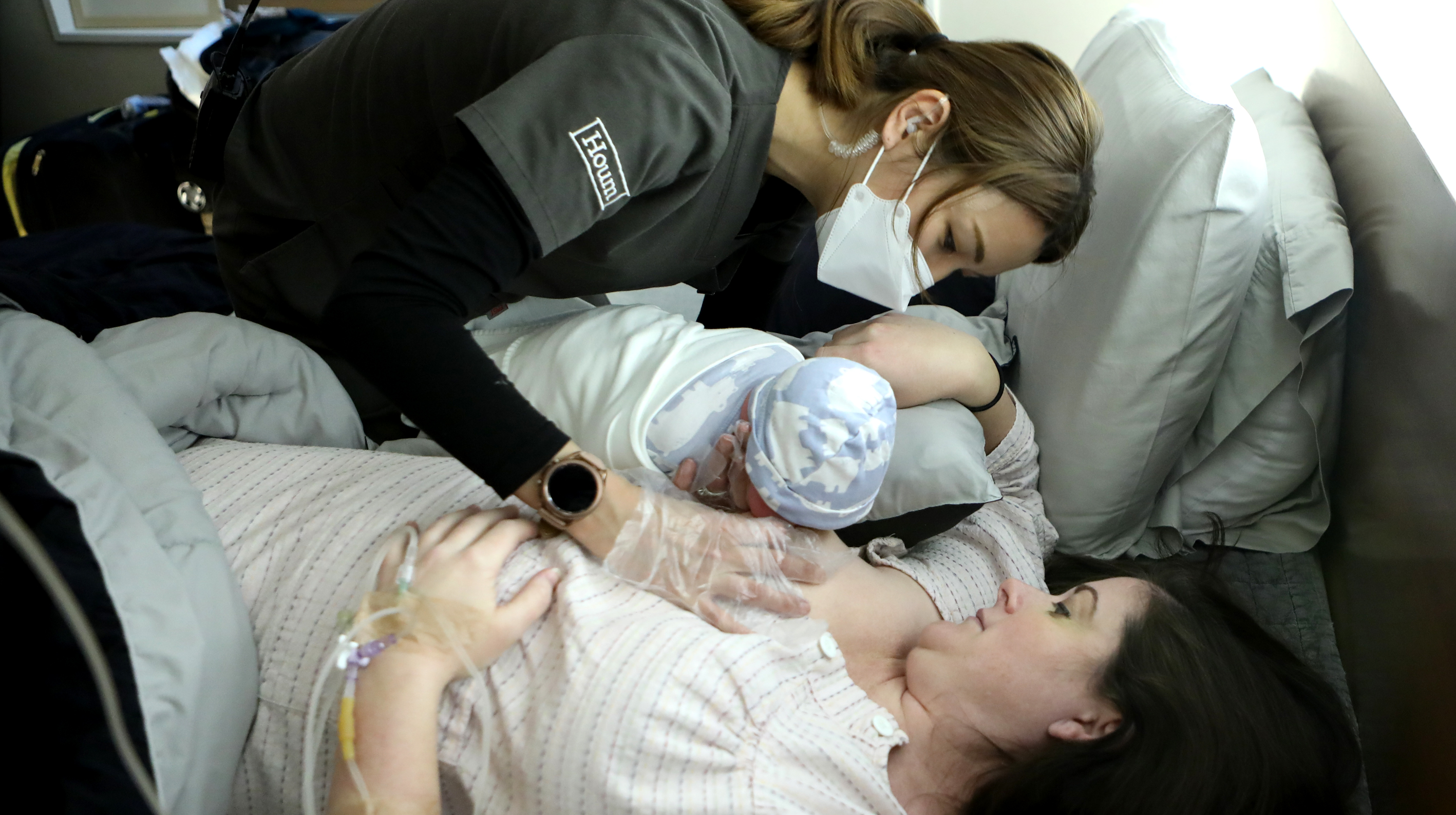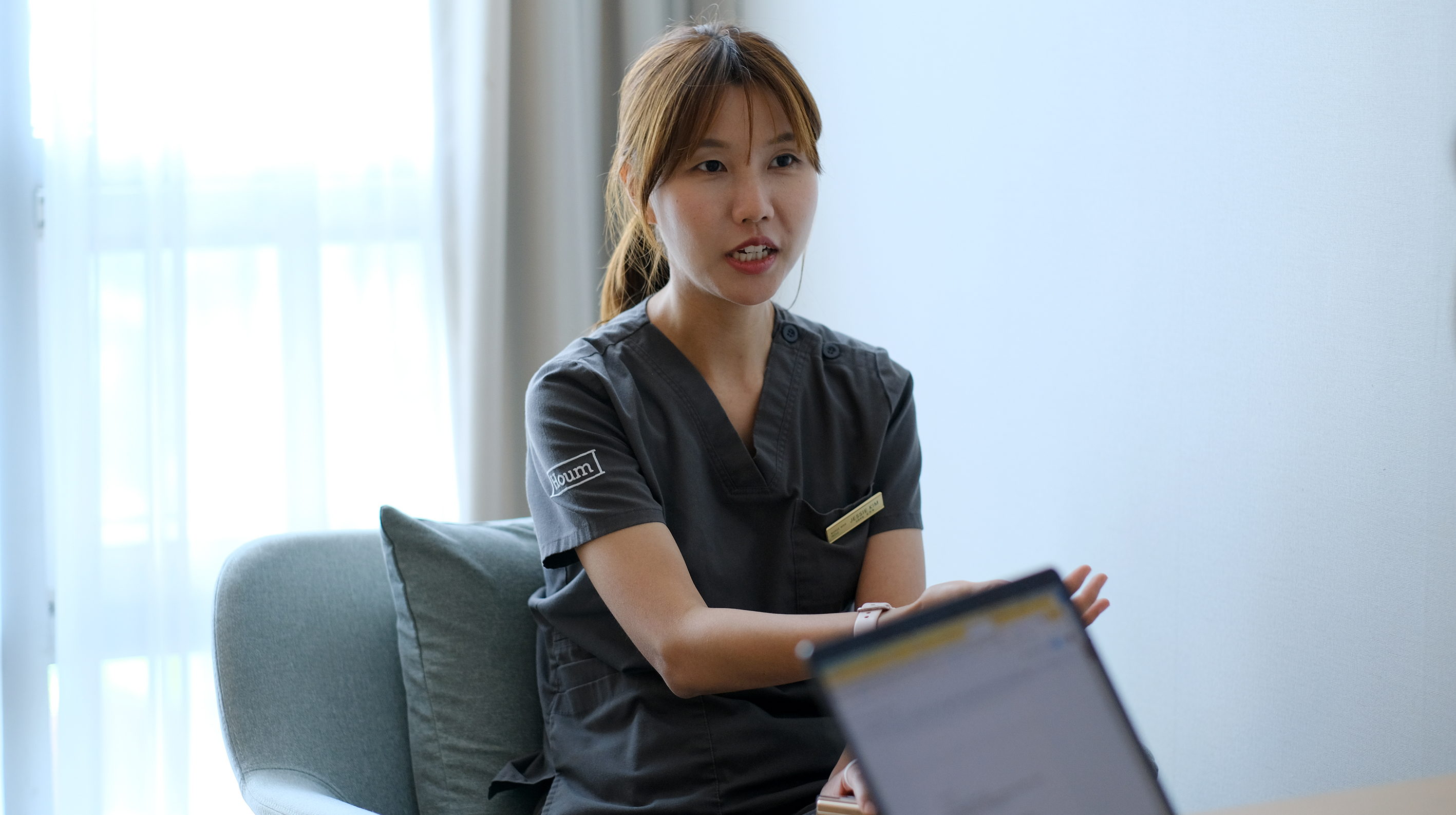Your child was born at Houm, right? Tell me about that experience.
Well, when I first started working here, I was single. The thought of having a child never crossed my mind. For me, childbirth was just something I had heard negative stories about from people around me, and the only experience I had was from observing hospital births during my nurse training.
However, working at Houm changed everything. I still remember being deeply moved by such moments when I first started. Dr. Chung himself emphasizes the importance of understanding and meeting our customers' needs above all else. In our birthing center, we aim to create a home-like environment. There's no labor ward, so mothers often struggle with lifting their legs for treatment. I recall a touching incident where Dr. Chung knelt down and asked a mother to rest her feet on his shoulders for comfort during a procedure. It's an unimaginable scene! In Korea, doctors tend to maintain a certain level of authority, and there's usually a barrier between them and the patients. Witnessing such humility from our head physician was truly eye-opening.
With heartwarming moments in the birthing room, I thought, "Why not me?" So, I met my current husband, got married, and we had our son. Thanks to my time at Houm, a family was born! These moments have naturally shaped my approach as a nurse as well. They've inspired me to strive for that level of empathy and connection with our customers.
Did you also get the IBCLC certification as a lactation consultant during that time?
Certainly! While studying and breastfeeding my son, I realized the importance of proper breastfeeding support. Just like how my previous negative perception turned into a positive experience after giving birth to my son, the same happened with breastfeeding.
I have six nephews, and four of them attempted breastfeeding but faced difficulties due to jaundice and eventually stopped. Seeing my sisters struggle made me believe that breastfeeding was incredibly challenging. I also thought that because I didn't have even well-developed milk ducts like my sisters, my child would experience jaundice and end up in the incubator, ultimately leading to breastfeeding failure. That's what I believed!
While studying breastfeeding, I realized that many people fail, especially in Korea, because literally they don't know how to do it. I felt sorry for them, thinking that if someone could guide them properly, anyone could do it. So until now I continue to study and help mothers after childbirth as a lactation consultant.

What's your main role at Houm?
I handle a range of tasks here. Currently, I'm the head nurse, overseeing operations, connecting various tasks, and ensuring everything runs smoothly. Given the diverse cases we deal with, teams are formed accordingly. Alongside, I provide nursing care, offering breastfeeding support, coordinating surgical teams, and providing postoperative care.
You also obtained your NCLEX-RN qualification in the United States. How has it impacted you?
Yes, I got my NCLEX-RN qualification during my time in the U.S. Interestingly, I thought living there would naturally improve my English skills, but returning to Korea, I realized my language abilities hadn't improved as much as I'd hoped. This realization motivated me to study English diligently, which I continue to do. Working with many clients has significantly improved my language proficiency and communication skills. Understanding cultural nuances is crucial for effective communication, and over time, I've become adept at discerning intentions, even when expressed eloquently.
You've been one of the longest-serving employees here. What keeps you motivated?
I find great pride in doing meaningful work. Providing the best care from the perspective of both a mother and a patient is rewarding. I didn't want to experience medical treatment or childbirth elsewhere, so working at Houm felt like the right fit.
Also, It's rare to find a place where work feels both challenging and enjoyable. Unlike other hospitals where tasks are divided within a large system, here, we have the opportunity to care for each individual continuously. Some customers come here as gynecology patients and end up getting pregnant. I've had the privilege of meeting them through their first, second, and even third childbirths. In Korea, we call this feeling ‘jeong(정)’, akin to meeting a friend each time we see them. It is more than the warm feeling of attachment. There's a special connection with our customers that feels truly rewarding.
Lastly, what moments do you find most enjoyable in your work?
The most enjoyable moments for me are when I see that my advice has truly helped our customers. For example, providing practical information during postpartum discharge education sessions and seeing satisfied mothers leaving with confidence brings me immense satisfaction.
Usually, when a patient asks a question outside the routine, the typical response is, 'That's not my job. Ask somewhere else.' But not only me but most of our staff are curious about what the customer currently wants to know, and they tend to explain why certain tests are needed and to communicate. So, most of the customers who come to us want their choices respected and want to have conversations. It’s definitely a win-win!
Thank you for sharing your insights and experiences with us.


